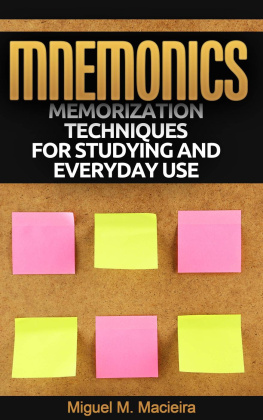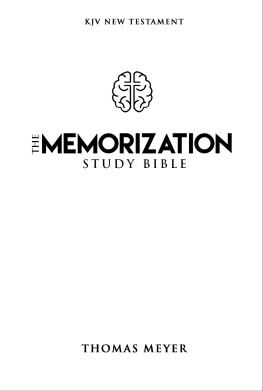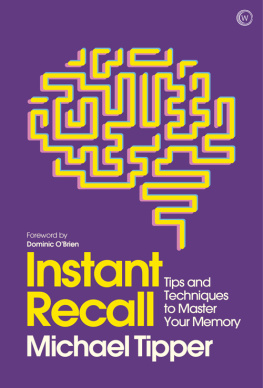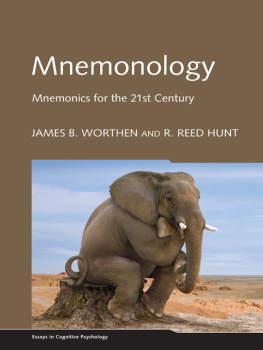Miguel M. Macieira - Mnemonics: Memorization Techniques for Studying and Everyday Use
Here you can read online Miguel M. Macieira - Mnemonics: Memorization Techniques for Studying and Everyday Use full text of the book (entire story) in english for free. Download pdf and epub, get meaning, cover and reviews about this ebook. year: 2016, publisher: Babelcube Inc., genre: Computer. Description of the work, (preface) as well as reviews are available. Best literature library LitArk.com created for fans of good reading and offers a wide selection of genres:
Romance novel
Science fiction
Adventure
Detective
Science
History
Home and family
Prose
Art
Politics
Computer
Non-fiction
Religion
Business
Children
Humor
Choose a favorite category and find really read worthwhile books. Enjoy immersion in the world of imagination, feel the emotions of the characters or learn something new for yourself, make an fascinating discovery.
- Book:Mnemonics: Memorization Techniques for Studying and Everyday Use
- Author:
- Publisher:Babelcube Inc.
- Genre:
- Year:2016
- Rating:3 / 5
- Favourites:Add to favourites
- Your mark:
- 60
- 1
- 2
- 3
- 4
- 5
Mnemonics: Memorization Techniques for Studying and Everyday Use: summary, description and annotation
We offer to read an annotation, description, summary or preface (depends on what the author of the book "Mnemonics: Memorization Techniques for Studying and Everyday Use" wrote himself). If you haven't found the necessary information about the book — write in the comments, we will try to find it.
Mnemonics: Memorization Techniques for Studying and Everyday Use — read online for free the complete book (whole text) full work
Below is the text of the book, divided by pages. System saving the place of the last page read, allows you to conveniently read the book "Mnemonics: Memorization Techniques for Studying and Everyday Use" online for free, without having to search again every time where you left off. Put a bookmark, and you can go to the page where you finished reading at any time.
Font size:
Interval:
Bookmark:
Mnemonics: Memorization Techniques for Studying and Everyday Use
Miguel M. Macieira
Translated by Renato Santana dos Santos
Mnemonics: Memorization Techniques for Studying and Everyday Use
Written By Miguel M. Macieira
Copyright 2016 Miguel M. Macieira
All rights reserved
Distributed by Babelcube, Inc.
www.babelcube.com
Translated by Renato Santana dos Santos
Babelcube Books and Babelcube are trademarks of Babelcube Inc.
WARNING
The content below reflects the authors views and should not be taken as guidance to the reader, who may or may not adopt the following guidelines or the listed information, at your own risk.
Always look for the advice of a professional to guide you in your decision-making.

A poor memory is, without a doubt, a major drawback for students and professionals - after all, we all have to remember a multitude of information to be successful in your studies or career.
The good news is that virtually anyone can improve your memory through physical exercises, health maintenance and also the memorization techniques. In this book, we'll talk in more detail about the memorization techniques, known together as mnemonics.
It is important to notice that the mnemonics can be used by anyone, regardless of age and professional occupation.
Before we begin, let's establish a few brief comments about the mind and how it memorizes information.
How the brain remembers
The brain is an amazing organ and also really complicated. The primary components that store and retrieve the information are neurons and synapses. The neurons send and receive electric signals, and the synapses are the connections between nerve cells. When we remember something, neurons send signals to the brain to create a string of data that we know as memory. The more efficient the synapses, the easier it is to retrieve information. In addition, regular use of synapses creates stronger connections and consequently makes more efficient the evocation of the desired information.
Short-and long-term memories
Short-term memory comes into play when a student passes the whole night studying for the next days exam. This is not a wise strategy because probably he will forget much of what was studied. In addition, as the goal is to pass the test, once you have a grade high enough, there wont be additional reasons to make the necessary revision of the studied subject.
The long-term memory, on the other hand, focuses on conceptual understanding. In addition, it is constructed by repetition of the most valuable information, a very important task for the prolonged retention of the data you wish to preserve.
What are mnemonics?
The word mnemonics comes from Mnemosyne, the Greek goddess of memory. By speaking of mnemonics, we are referring to memorization techniques that people use to store and retrieve the information believed to be important and useful.
In addition to the techniques that will be presented in this work, nothing prevents you from using your own memorization methods. To this end, the trick is to find out which type is your learning: visual, auditory or synesthetic. The use of mnemonics will depend on each persons profile.
The techniques in this book benefit more those people who learn by visual ways. However, if your learning is auditory, you can store information that relates to the information by hearing audio files or creating easy to remember rhymes. An apprentice of the synesthetic type must imagine him/herself using tools and objects to undertake actions, and relate the body movement with the information he or she desires to keep.
People with fantastic performances of memory often use the techniques described in this book. They do not possess any extraordinary ability, as many believe. They found out how to use this thing we have between the two ears - the brain.
***
G iven these considerations, it's time to dive into the world of mnemonics! Turn the page and let's get started.

B elow, we will see how mnemonics works, the advantages and disadvantages of using memorization techniques, among other topics.
Advantages of mnemonics:
We can point out the following advantages of mnemonics:
- It offers a "memory bridge" that helps you remember information that would be difficult to recover otherwise;
- Works well when the user customizes the techniques, adapting it to their personal tastes. Thus, he becomes an active learner;
- Provides new ways to understand information and materials of studying, making them more interesting;
- Once their principles are mastered, the time necessary to retrieve the information gets shorter;
- You can store more information without burdening your mind with useless data. As you rearrange the information in your own way, it's easier to retrieve it when needed.
Disadvantages of mnemonics:
Mnemonics also has disadvantages:
- For the memorization techniques to work, they need to be practiced;
- The process of learning, practice and even to create the memorization techniques, is something that takes time and requires effort;
- When used by students, it can give a false sense of security as if you actually know the test or contest subject;
- As the techniques are grounded more on memorizing than understand , maybe it leads to subject comprehension issues. Of course, that to eliminate the need to understand a subject is not the goal of mnemonics. In fact, the memorization techniques constitute additional learning strategies .
- If used in excess, it can lead to confusing situations, in which it is not known what technique was used to ease the retention of a specific piece of information.
How mnemonics work
The memorization techniques leverage the memorys power. This happens by building structure, meaning and signification, which are attached to information once devoid of these characteristics. It's like it was added an additional meaning to the base information, in order to make it memorable. Therefore, memorization techniques do not have to be applied to data that already draw attention and that make obvious sense in the given context. Conversely, when information draws no attention and does not have much meaning, it's interesting that the student's relies upon mnemonics.
Memorization and association
Memorization strategies work effectively through association. Indeed, the easiest way to learn something new is to associate this new given data to interesting images, or something you already know.
We all have experiences, interests, and hobbies in different fields of knowledge and life areas. In view of this reality, it is advisable to use the knowledge that you already have when applying mnemonics, in order to make the link between what you already know and what you don't know. The fresh data will be better assimilated and stored in that way.
Moreover, unique, or even crazy images are always easier to remember. Therefore, an effective use of mnemonics is precisely to associate new information with the crazy images that you can imagine.
The core idea is to encode the information with vivid mental images, thereby establishing the structure of information "where" you'll "put" information.
The new data will be easier to retrieve when you link them with mental images and information already known. As we move forward in this work, we will present practical tips to make this association.
Next pageFont size:
Interval:
Bookmark:
Similar books «Mnemonics: Memorization Techniques for Studying and Everyday Use»
Look at similar books to Mnemonics: Memorization Techniques for Studying and Everyday Use. We have selected literature similar in name and meaning in the hope of providing readers with more options to find new, interesting, not yet read works.
Discussion, reviews of the book Mnemonics: Memorization Techniques for Studying and Everyday Use and just readers' own opinions. Leave your comments, write what you think about the work, its meaning or the main characters. Specify what exactly you liked and what you didn't like, and why you think so.











